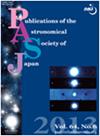KAgoshima Galactic Object survey with Nobeyama 45 m telescope by Mapping in Ammonia lines (KAGONMA): Discovery of parsec-scale CO depletion in the Canis Major star-forming region
IF 2.2
4区 物理与天体物理
Q2 ASTRONOMY & ASTROPHYSICS
引用次数: 0
Abstract
In observational studies of infrared dark clouds, the number of detections of CO freeze-out on to dust grains (CO depletion) at the pc scale is extremely limited, and the conditions for its occurrence are, therefore, still unknown. We report a new object where pc-scale CO depletion is expected. As part of the Kagoshima Galactic Object survey with Nobeyama 45 m telescope by Mapping in Ammonia lines (KAGONMA), we have made mapping observations of NH3 inversion transition lines towards the star-forming region associated with Canis Major OB1, including IRAS 07077−1026, IRAS 07081−1028, and PGCC G224.28−0.82. By comparing the spatial distributions of NH3 (1,1) and C18O (J = 1–0), an intensity anti-correlation was found in IRAS 07077−1026 and IRAS 07081−1028 on the ∼1 pc scale. Furthermore, we obtained a lower abundance of C18O at least in IRAS 07077−1026 than in the other parts of the star-forming region. After examining high-density gas dissipation, photodissociation, and CO depletion, we concluded that the intensity anti-correlation in IRAS 07077−1026 is due to CO depletion. On the other hand, in the vicinity of the center of PGCC G224.28−0.82, the emission line intensities of both NH3 (1,1) and C18O (J = 1–0) were strongly detected, although the gas temperature and density were similar to IRAS 07077−1026. This indicates that there are situations where C18O (J = 1–0) cannot trace dense gas on the pc scale and implies that the conditional differences in which C18O (J = 1–0) can and cannot trace dense gas are unclear.利用野边山 45 米望远镜通过氨线测绘(KAGONMA)进行鹿儿岛星系天体巡天:发现大犬座恒星形成区的等秒尺度CO耗竭
在对红外暗云的观测研究中,在 pc 尺度上探测到尘粒上的 CO 冻结(CO 耗竭)的次数极其有限,因此其发生的条件仍然未知。我们报告了一个预计会发生 pc 级 CO 损耗的新天体。作为利用野边山 45 米望远镜进行的鹿儿岛银河天体巡天(KAGONMA)的一部分,我们对与大犬座 OB1 相关的恒星形成区,包括 IRAS 07077-1026、IRAS 07081-1028 和 PGCC G224.28-0.82 进行了 NH3 反转过渡线的制图观测。通过比较 NH3 (1,1) 和 C18O (J = 1-0) 的空间分布,我们发现 IRAS 07077-1026 和 IRAS 07081-1028 在 ∼ 1 pc 尺度上存在强度反相关。此外,我们至少在 IRAS 07077-1026 中获得了比恒星形成区其他部分更低的 C18O 丰度。在研究了高密度气体耗散、光解离和CO耗竭之后,我们认为IRAS 07077-1026中的强度反相关是由CO耗竭引起的。另一方面,在PGCC G224.28-0.82的中心附近,虽然气体温度和密度与IRAS 07077-1026相似,但NH3(1,1)和C18O(J = 1-0)的发射线强度都被强烈探测到。这表明在某些情况下,C18O (J = 1-0) 无法在 pc 尺度上追踪致密气体,这也意味着 C18O (J = 1-0) 能够和不能追踪致密气体的条件差异还不清楚。
本文章由计算机程序翻译,如有差异,请以英文原文为准。
求助全文
约1分钟内获得全文
求助全文
来源期刊

Publications of the Astronomical Society of Japan
地学天文-天文与天体物理
CiteScore
4.10
自引率
13.00%
发文量
98
审稿时长
4-8 weeks
期刊介绍:
Publications of the Astronomical Society of Japan (PASJ) publishes the results of original research in all aspects of astronomy, astrophysics, and fields closely related to them.
 求助内容:
求助内容: 应助结果提醒方式:
应助结果提醒方式:


